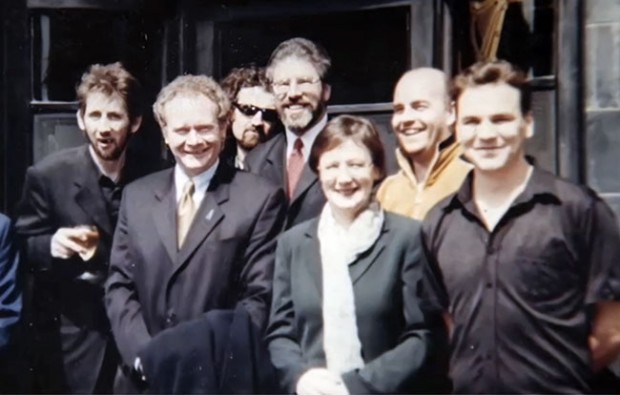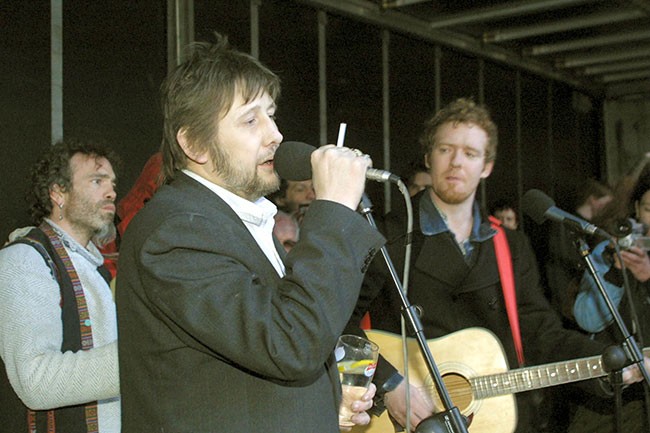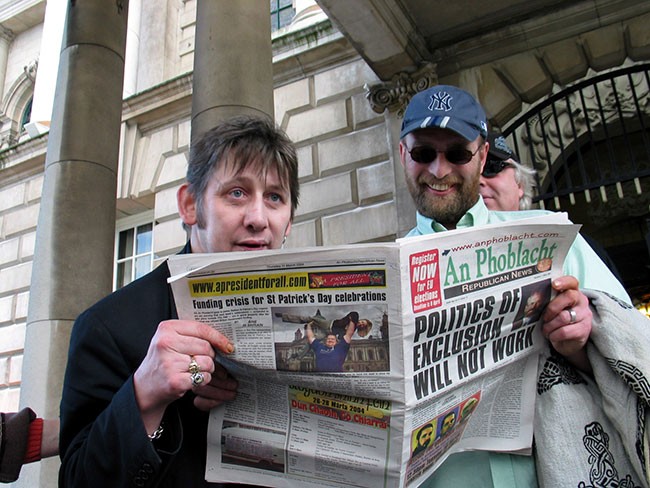30 November 2023
Shane MacGowan: A troubadour for the Irish in London

• Shane MacGowan and bandmates with Martin McGuinness, Gerry Adams and Bairbre de Brún in London 1997
Sad solemn notes and crates of newly drawn stout,
the usual symptoms when a life goes out.
But the extinction this time being seven times the most.
The music held no echo and the tears drowned our toast.
Sorrow and bereavement, life has no meaning now, silence is master.
Laughter and song bowed for gone went our great captain to some more hospitable inn
where cant and hypocrisy can no longer embarrass him.
So wrote Joe O’Broin in his seminal ‘Lament for Brendan Behan’. These words came to my head when I heard the sad news that Shane MacGowan has passed away.
The lament was famously, and powerfully, performed by Ciarán Bourke on The Late Late Show’s Tribute to The Dubliners in 1987. A video cassette of that tribute night held a hallowed place growing-up in my family. Passed around between grandparents and put on ‘in the background’ at family get-togethers and special occasions. As hard as it may be to believe, for family of the diaspora in Britain, it was genuinely a treat to have RTÉ on our television screens. Even if only for an afternoon - and even if everyone had already seen the show a dozen times before!
Shane MacGowan features in that tribute evening. The Pogues and The Dubliners perform ‘The Irish Rover’ and then they all return at the end for a group performance of ‘The Auld Triangle’, alongside the Fureys, Stockton’s Wing, U2, Christy Moore and others. Shane appears in the video young, very thin, and inexplicably holding a paper cup throughout.
The inclusion of The Pogues on that pantheon of Irish musicians was momentous for the diaspora. Even as a young person watching a worn-out video tape, their presence on the stage that evening represented a recognition that the London-Irish were not forgotten back home. We had a place on that stage.
The importance of Shane MacGowan, and The Pogues as a whole, for the Irish in Britain cannot be overestimated. The Pogues validated and gave voice to an Irish identity long disparaged as ‘plastic’ or ‘half’. An Irishness that often had to ‘keep the head down’ in Britain and ‘take a step backwards’ in Ireland.

• Shane singing during an Anti War Protest, Central Bank, Dublin, February 2003
But Shane didn’t just speak about his Irishness; he shouted about it. The Pogues exploded out of the London punk scene in the late 1970s. Only two of The Pogues’ nine members were born in Ireland. As Phil Chevron once put it, “The Pogues could never have been an Irish band indigenously – it could never have happened in Ireland. It would never have happened from within the island. The Pogues needed to happen from the diaspora… there are two Irelands – the people who live on the island and there’s the people who who went away or who are second generation and very often that gives us a different point of view on the culture and what it is to be Irish.”
Their songs were raucously Irish, but their references were almost uniquely London. Hammersmith Broadway. Albert Bridge. Kings Cross. Euston. Leicester Square. Soho. Camden. In Shane’s voice these spaces suddenly became Irish spaces. One could readily tour the streets of London with The Pogues, whether via the chaotic ‘Transmetropolitan’ or the beautiful ‘Lullaby of London’.
Lyrics like ‘Now Jimmy didn’t like his place in this world of ours, / Where the elephant man broke strong men’s necks, / When he’d had too many Powers…’ spoke to a generation that had grown up listening to horror stories about John ‘Elephant’ O’Donoghue, the most notorious ganger-man in London, and just how cruelly he treated men on his jobs. Shane MacGowan’s mastery of word and rhyme established an almost mythical narrative for the London-Irish exile.
But the appeal extended beyond London to the entire Irish in Britain community. As the comedian Frankie Boyle once articulated, “The Pogues did so many great songs though. I can’t tell you what a massive figure Shane MacGowan is for a lot of second-generation Irish people, a poet of displacement; it’s weird to think some folk only think of them in relation to a Christmas record.”
The Pogues were also unashamedly abrasive and political, at a time when being political about Ireland in Britain was no easy task. Infamously, when the band performed ‘Streets of Sorrow/Birmingham Six’ on Friday Night Live in April 1988 they were cut off air mid-performance for an ad-break. Shane’s landlady, Kathy MacMillan, would later complain to Points of View about such implicit censorship.
By October 1988, however, the song was banned from the airwaves in its entirety. On 19 October, the Broadcast Ban was introduced. Intentionally designed to deplatform Sinn Féin representatives from the airways, included on the list of censored material was ‘Streets of Sorrow/Birmingham Six’. According to the Independent Broadcasting Authority, the song was guilty of “alleging that some convicted terrorists are not guilty and that Irish people in general are at a disadvantage in Irish courts.” (Heaven forbid!)

• Shane MacGowan with the late Séamus Flynn at Belfast City Hall, March 2004
Frank Murray, The Pogues manager, retorted to news of the ban, “I’m glad to see we’re that important, that we’re a threat to the State.” Within a year of the Broadcast Ban, The Pogues would be vindicated. In October 1989 The Guildford Four were released and in March 1991 the Birmingham Six were finally released.
In a 1991 interview with ‘Irish Ways’, a magazine established by Irish in Britain, Shane reflected on the appeal of The Pogues: “I am not one of who people that thinks deeply about the media and how it relates to the arts and what it all has to do with politics. To me it all fits together fairly naturally and I couldn’t explain it to you nor am I going to try but what I will say to you is that Ireland is a country that has struggled for hundreds of years smashing against the walls of cultural, religious and political oppression and now it is a country that has more going for it than this country that has been oppressing it for the last 800 years. Ireland is a more hopeful place today than England.”
It is an observation that could only spring from the diaspora. Shane helped to nurture hope for a better tomorrow as only an exile could. Through the hardship and the struggle, there was a light that stayed lit. That emigrant flame. That was the fire that Shane helped stoke. The Irish in Britain will forever owe a debt to Shane MacGowan for that.
‘I awoke so cold and lonely in a faraway place
The sun fell cold upon my face, cracks in the ceiling spelt hell
Turned to the wall, pulled the sheets around my head
Tried to sleep and dream my way back to you again.’
‘Misty Morning, Albert Bridge’
Shane is survived by his wife Victoria, his sister Siobhan, his father Maurice, and family and a large circle of friends.
Follow us on Facebook
An Phoblacht on Twitter
Uncomfortable Conversations

An initiative for dialogue
for reconciliation
— — — — — — —
Contributions from key figures in the churches, academia and wider civic society as well as senior republican figures





